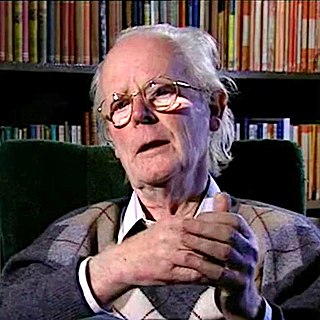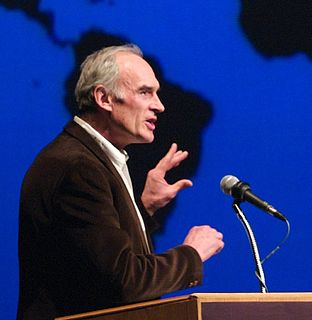Top 1200 Societies Quotes & Sayings - Page 2
Explore popular Societies quotes.
Last updated on December 4, 2024.
The vigour of civilised societies is preserved by the widespread sense that high aims are worth while. Vigorous societies harbour a certain extravagance of objectives, so that men wander beyond the safe provision of personal gratifications. All strong interests easily become impersonal, the love of a good job well done. There is a sense of harmony about such an accomplishment, the Peace brought by something worth while. Such personal gratification arises from aim beyond personality.
Feudal societies don't create great cinema; we have great theatre. The egalitarian societies create great cinema. The Americans, the French. Because equality is sort of what the cinema deals with. It deals with stories which don't fall into 'Everybody in their place and who's who,' and all that. But the theatre's full of that.
I think most generations tend to learn the lesson of war the hard way. There is a deep attraction to the empowerment. Freud is right: societies either become locked in a collective embrace of Eros, as individuals do, or a collective embrace of Thanatos, the death instinct. They swing between the two. The notion that societies are naturally prone toward self-preservation is wrong. Self-annihilation can be deeply addictive, intoxicating, enticing. So I take a darker view of human nature, that war is probably always going to be with us. I think history bears me out.
What I mean by the common good is that we understand we're all part of something bigger than ourselves, that we live in societies together and must help take care of one another because you never know when you're going to need to be taken care of by others. And it's not enough to say that your family or your church is going to take care of you. Societies are collective entities, we're meant to be connected to one another; the function of government is to administer that connection.
I believe, whether it is the United States or Europe, they will all end up as multicultural societies. So India's this great experiment of a billion people of such great diverse persuasion, working together, seeking their salvation in the framework of a democracy. I believe it will have some lessons for all the multicultural societies.
If you were dealing with the accumulated repressions of only one lifetime, it would be different. But these are the repressions of numerous lives. Nobody knows how many times you have been born, and how many societies have crushed you. And each time a different society, and all these societies destroying you in different ways... this is why you carry so many inner contradictions.
Which other major religion is based on the Godhead incarnate being whipped, tacked to a cross, stabbed? Only the Marquis de Sade could have made up a sicker religion. It's no wonder that those brought up in such a culture hate life and enjoy inflicting pain. All societies are sick but some are sicker than others. Christian societies are certainly the sickest.
Al Jazeera should understand the societies, should understand the culture of the civilisation, should understand the dynamics of the societies, should be part of this understanding; and on the other level, Al Jazeera should concentrate on the margin rather than the centre. It means that Al Jazeera should be close to the public.
If two people stare at each other for more than a few seconds, it means they are about to either make love or fight. Something similar might be said about human societies. If two nearby societies are in contact for any length of time, they will either trade or fight. The first is non-zero-sum social integration, and the second ultimately brings it.
Obviously Muslim societies, like societies elsewhere, are becoming increasingly urban, many are becoming industrial, but since so many have oil and gas, they don't have a great impetus. But again, the revenue that natural resources produce gives them the capability and so countries like Iran are beginning to develop an industrial component.
We usually forget that apart from making a living on this earth, human beings live in societies and these societies have cultures. It is only through having cultures that mankind on this earth has an ordered and meaningful life. Music and drama are two of the many important manifestation of a culture. They are important because they represent the expressions emanating from the power of human artistic creativity
For most of history, war has been a more or less functional institution, providing benefits for those societies that were good at it, although the cost in money, in lives, and in suffering was always significant. Only in the past century have large numbers of people begun to question the basic assumption of civilized societies that war is inevitable and often useful.
Do you dance, Mr. Darcy?" Darcy: "Not if I can help it!" Sir William: "What a charming amusement for young people this is, Mr. Darcy! There is nothing like dancing, after all. I consider it as one of the first refinements of polished societies." Mr. Darcy: "Certainly, sir; and it has the advantage also of being in vogue amongst the less polished societies of the world; every savage can dance.
There are a few societies that show signs of having been very rational about the physics of construction and the physics of real life. Some of the old middle-Eastern societies had downdraft systems over whole cities, and passive, rapid-evaporation ice-making systems. They were rational people using good physical principles to make themselves comfortable without additional sources of energy.
I care about Ukraine's success as a country; I'd like to see the conflict resolved. I'd like to see us getting back to the idea we - you know, over many, many administrations, starting with George H.W. Bush and onward, we talked about a Europe whole, free and at peace. That we're looking to promote democratic societies, prosperous, market-driven societies and security for everybody, indivisible, including Russia. And we have never gotten there.
Sociological method as we practice it rests wholly on the basic principle that social facts must be studied as things, that is, as realities external to the individual. There is no principle for which we have received more criticism; but none is more fundamental. Indubitably for sociology to be possible, it must above all have an object all its own. It must take cognizance of a reality which is not in the domain of other sciences... there can be no sociology unless societies exist, and that societies cannot exist if there are only individuals.
If war can indeed be turned into a relic, then the virtue of greed will recede further. From a given society's standpoint, one big upside of wanton material acquisition has traditionally been the way it drives technological progress-which, after all, helps keep societies strong. In the nineteenth century, Russia ans Germany had little choice about modernizing; in those days stasis invited conquest. But if societies no longer face conquest, breakneck technological advance is an offer they can refuse, and frugality a luxury people can afford.
As an engineer, I understood that the natural world operated according to fixed laws. Through my studies, I came to realize that there were, likewise, laws that govern human wellbeing. It seemed to me that these laws are fundamental not only to the wellbeing of societies, but also to the miniature societies of organizations. Indeed, that is what we found when we began to apply these principles systematically at Koch Industries. Through our observation of how they could create prosperity in an organization, I began to systematize my beliefs into Market-Based Management.
Growing terrorism, permissive societies, democracy collapsing through lack of law and order. If things continue on their present track, the disintegration of Western societies will occur much sooner than you think under the hammer blows of fascism and communism. Freedom is not something that does not have a breaking point, and your enemies would like you to reach that point.
Look at the history of the printing press, when this was invented what sort of consequences this had. Or industrialization, what sort of consequences that had. Very often, it led to enormous transformational processes within individual societies. And it took awhile until societies learned how to find the right kind of policies to contain this and manage and steer this.
I spent the first years working in Jordan trying to learn as much as I could about what was taking place in the country, about where there were gaps in the development process that needed attention. Inevitably, there were certain common denominators which are fairly common to all developing societies, perhaps to all societies: that quality education be accessible to everyone, not just a limited elite few; the sustainable conservation of natural resources; the full engagement of women in national development; and the value of cross-cultural exchange and understanding to international relations.
What I think it's important to recognize in today's world is that all of our societies are multiethnic, multi-religious and multicultural. And that is a positive thing. That's a richness, and also strength. But we also have to recognize that, for those societies to be harmonious, there is a lot of the investment that needs to be made in social cohesion and inclusivity. But the important thing to recognize, and particularly Europe, most of the terrorist attacks are not done by people that came from the outside. They are homegrown.
Modern societies accepted the treasures and the power offered them by science. But they have not accepted - they have scarcely even heard - its profounder message: the defining of a new and unique source of truth, and the demand for a thorough revision of ethical premises, for a complete break with the animist tradition, the definitive abandonment of the 'old covenant', the necessity of forging a new one. Armed with all the powers, enjoying all the riches they owe to science, our societies are still trying to live by and to teach systems of values already blasted at the root by science itself.
I know that societies often have killed people who have helped to change those societies. And if I can die having brought any light, having exposed any meaningful truth that will help destroy the racist cancer that is malignant in the body of America, then, all credit is due to Allah. Only the mistakes have been mine.
In authoritarian societies, control over the production, distribution, and circulation is generally in the hands of the government, or what might be termed traditional modes of political sovereignty. But in neoliberal societies, sovereignty is often in the hands of major corporations that now have power over not only the production of knowledge but also over the implementation of policies that bear down on matters of life and death, living and surviving.
The colonial experience all Muslim countrieswent through may be a factor in the fight against Western domination, British, French or whatever. They were until recently largely rural societies with land owning governing elites in most of them. I think they are certainly moving toward urbanization and much more pluralistic political systems. In almost every Muslim country, that is occurring. Obviously they are increasing their involvement with non-Muslim societies. One peak aspect of this, of course, is the migration of Muslims into Europe.
























































